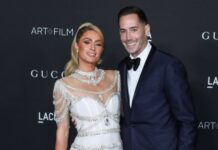There is so much about Natalie Portman you’ve forgotten.
You remember that she started out at 12 as the star of Luc Besson’s The Professional and that she won an Academy Award in 2011 for Black Swan.
But you’ve forgotten that she worked with Al Pacino, Woody Allen, and of course George Lucas on the Star Wars prequels, all before earning a bachelor degree in psychology from Harvard University.
At her press conference for Jackie, for which she’s a front runner in the Oscar race, the 35-year-old is notably pregnant, quietly subdued as if still playing the famous icon.
In the past, she had set boundaries, refusing to discuss her relationship with Gael Garcia Bernal, whom she was dating.
“I’m sorry I don’t discuss my private life at all. I like reading about other people’s lives, but I won’t talk about mine,” she said.
So, of course, she won’t talk about her storybook romance with her Black Swan choreographer, Benjamin Millepied, whom she married in 2012.
I remember the first time I interviewed her, she was only 14 but remarkably precocious.
I knew New York Jewish girls are supposed to mature early, but Portman was off the charts.
She answered questions with more sophistication than her much older Beautiful Girls co-stars Tim Hutton and Matt Dillon.
How has motherhood changed you as an actress?
Well, it changes your life in a very meaningful way, but as an artist it’s important that the time you spend away from your family is spent with purpose.
My husband has the same feeling. It’s a big issue for men too, but it’s more logistical than anything, making choices for your family and not just for you.
Did your advanced education help you become a better actress?
Not really. For me acting is very emotional; it requires you to forget your intellect.
Education gives you knowledge of the world and of people.
I chose to get an education for that reason, not because I thought it would make me a greater actor.
Do you have a drama coach?
No, I’ve never taken acting lessons or coaching or anything.
But you studied ballet at age four. How did you get into acting?
I was approached by Revlon to do modelling, but I didn’t want to model. I wanted to act, and I was lucky to find an agent.
As a little girl, I would organise the neighbourhood kids into mini-Broadway shows.
I’ve always believed acting is fun. It’s much easier than doing surgery. I can think of 50,000 jobs that are harder!
Did your parents encourage you?
They were very supportive but not pushy. As a teenager they let me do whatever I wanted.
They trusted me because they’d given me a strong upbringing.
They knew I could take care of myself and protect myself. I come from a really solid family background.
What are your interests?
I’m really interested in politics. I’m interested in the rest of the world.
I’m concerned about world poverty particularly the feminisation of poverty.
I work with a group called Finca, which is a microfinance organisation that gives small loans to very poor women.
They’re in 22 different countries.
I’ve been to Guatemala and Uganda meeting with some of our clients.
I met a woman in Uganda who’s been in the programme for 10 years; she had 10 daughters, her husband was beating her because she couldn’t give him a son.
She was living on 80 cents a day.
With her US$50 loan, that’s all we provide, she now has her own business, and she hires seven other women.
She was able to get rid of her husband and one of her children is going to university. So it’s been an incredible experience.
Women are also marginalised in Hollywood. What do you see are the challenges there?
I think it’s becoming more and more apparent to us every day the bias against women, which women inflict upon other women, so we have also internalised all the sexism ourselves.
The competition between women, the feeling that there is only room for one, and the feeling that it’s a zero sum game, that your win means someone else’s loss or vice versa.
And that’s really dark and damaging, and I think it will take a lot of work to get out of that and be a team with women.
We see it a lot in films. I can’t sit through another movie with 20 men and one woman, who is the wife or the one woman in the office or something, because it’s perpetuating a world of men and it’s perpetuating the feeling that there is only room for women in a group.
And that’s evident even in children’s films.
Obviously I see a lot of children’s films now, the characters may all be animals, but they are still all male, with one female or two females.
And what does that put into kids’ minds? You don’t see females interacting with each other.
In my life as a woman, the only people I interact with besides my husband and my kid are women.
So, there’s a real lack there. And it sets up a feeling among women that we are not as generous to each other as we should be.
We need the support system that men have, the way Spielberg and Coppola and Scorsese get together editing each other’s movies and helping each other.
That is the kind of relationship we need to aspire to, a recognition that we are all on the same team.
Who are the women you admire?
Jill Soloway, Elena Ferrante, I am obsessed with her writing and I love the fact that she has kept herself so private.
And there are young women like Malala (Yousafzai) who is so inspiring, imagine the fear she had to overcome to be such a great leader.







